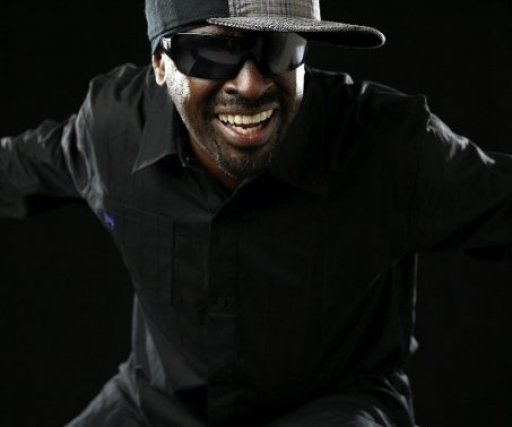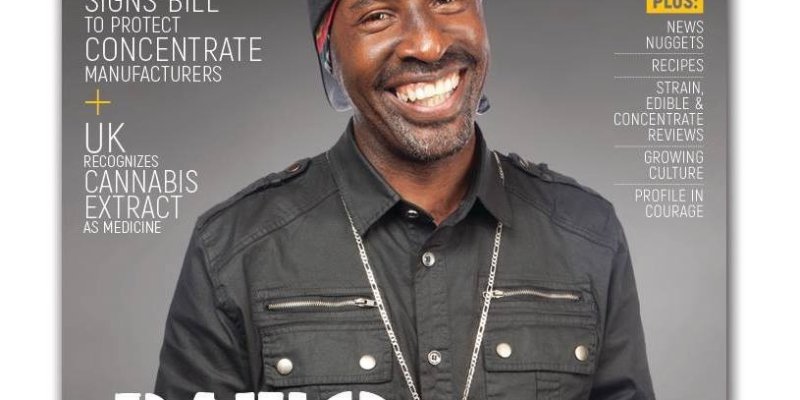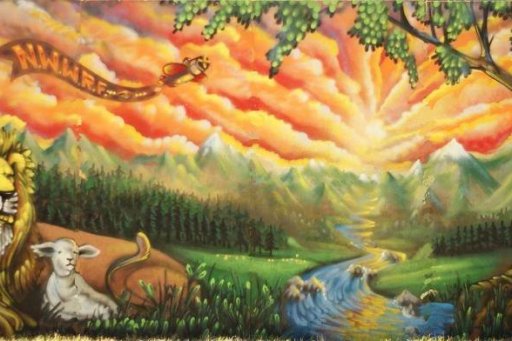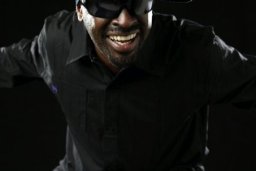 Reggae star Pato Banton was in the midst of his biggest-ever tour—a global trek for Peter Gabriel’s WOMAD organization in 2000—when he learned that two of his sons had been injured in a drive-by shooting in his native England. He immediately put his burgeoning career on hold to go hunt-down the perpetrator. Gunman found, he then turned his outrage and sorrow into the impetus for award-winning community and educational initiatives which would consume the next six years of his life.
Reggae star Pato Banton was in the midst of his biggest-ever tour—a global trek for Peter Gabriel’s WOMAD organization in 2000—when he learned that two of his sons had been injured in a drive-by shooting in his native England. He immediately put his burgeoning career on hold to go hunt-down the perpetrator. Gunman found, he then turned his outrage and sorrow into the impetus for award-winning community and educational initiatives which would consume the next six years of his life.
Reading like some gritty screenplay, this extended episode epitomizes a man whose four-decade public presence has increasingly transcended music to convey a singularly positive and often spiritual message. Emerging from a working-class community in Britain’s second-largest city, Birmingham, in the 1970s, Banton is now based in Southern California, from where he continues to tour extensively while simultaneously serving as a mentor (and sometimes minister) to fans worldwide.
Banton was almost born into a world of reggae sound systems, with his Jamaican DJ stepfather hosting illegal house parties in his childhood home at which the pre-teen served as a lookout, doorman and ultimately, performer. Born Patrick Murray, Banton’s nocturnal musical escapades earned him the nickname “Patoo,” a Jamaican word for owl (“Banton,” meaning formidable lyricist, was added by music producers later).
By his late teens, “Ranking Pato” had been declared his hometown’s number one MC seven years in a row and was touring Europe with a local reggae band. But it was his performance on The Beat’s 1982 album Special Beat Service that put him on the mainstream map. Appearances on UB40’s 1985 Baggariddim and Little Baggariddim releases confirmed Banton as a major toasting talent and imminent solo force.
Banton’s debut solo album, ‘85s Mad Professor Captures Pato Banton, is still regarded as a genre classic. A string of hits including “Absolute Perfection” and “Handsworth Riot” followed. By the mid 1990s he was topping charts internationally with a cover of Eddy Grant’s “Baby Come Back” (featuring Ali and Robin Campbell of UB40) and collaborations with Sting (a remix of “This Cowboy Song” and a remake of the Police’s “Spirits in a Material World”).
Throughout, Banton has been an outspoken promoter of cannabis (referencing how he “smoke up the ganja” on his second single “Allo Tosh,” and that he “only smoke the sensimilla” on 1987 classic “Don’t Sniff Coke”).
A famously charismatic, inclusive live performer known for evocative storytelling and comic vocal characterizations, Banton threw himself into philanthropic work after his sons’ shooting, founding community projects, becoming a qualified music teacher, and setting up his own School of Musical Arts and Technology in Birmingham. He has earned numerous accolades for his musical and humanitarian accomplishments, including the BBC’s prestigious Lifetime Achievement Award.
Upon returning to music-making a decade ago, Banton embarked upon a mission to spread positivity, spirituality and universal love. He has two new albums slated for release in February and will be touring in the U.S., U.K., Africa and Asia next year. He just re-recorded “Baby Come Back” with Ali Campbell for a new UB40 release.
CULTURE chatted with the affable Banton about his music, message, and long relationship with cannabis.
Starting out in Birmingham in the 1970s, would you ever have pictured yourself still having a thriving career and living in sunny Southern California nearly four decades later?
I would not! I had a lot of doubts about my future, but music was always my hobby . . . So it’s really just been an evolution of fun and just a continuation of my love of music and never really felt like an “official” career.
Can you paint a picture of the sound system scene from which you emerged?
We’d have our sound system in [a living room] with our music box with all the records in it and a speaker box that took up half the room! And we’d be playing music just really for our friends in a dark room and just going on the microphone and chanting lyrics, ‘til eventually it emerged for us to be in nightclubs doing the same thing.
What does a typical week in the life of Pato Banton look like these days?
Getting the band together . . . hitting the road; doing shows [and] doing interviews while I’m travelling. Writing lyrics. And I’m on my computer every chance I can get—I’m reaching out to new promoters, booking shows for months ahead, because I do my own bookings, I shoot my own videos, I record my own songs in my own recording studio. So it’s really non-stop.
You seem to tour constantly. Is that the best part of the job?
I get great pleasure out of meeting people—meeting my fans; meeting other artists in the industry; seeing new places. And one of my main motivations is to make people feel better, so I get a chance to meet my fans, talk to them, uplift their spirits—while I’m performing and in person.
So I’m not just trying to build a fanbase—I’m actually building a spiritual family as well as I travel, and to me that’s the ultimate goal.
Your live shows are unusually participatory experiences. What is your approach to concert performance?
It’s not about me just going on stage and doing a rehearsed show—it’s about saying ‘how can I get this entire crowd of people . . . involved in this experience, connected to each other, and get everybody feeling good.’
We never have a set list . . . So it’s really a personal experience for the crowd and no two nights are the same.
How has your sense of humor helped you spread your message?
I think the sense of humor is very important, especially considering that most of my lyrics are pretty serious . . . [It] allows people to let go of the stress and drama, enjoy the moment, but also reflect on subjects that are meaningful.
From your earliest days recording with Ranking Roger and UB40 to your later hits with Sting and recent work with Mystic Roots, collaboration appears crucial to your creativity. Why is that?
It’s friendship when I bond in the studio with another artist . . . And then creating something new, to me, is just very, very inspiring. You touch their audience with your style and then touch your audience with their style.
I can do albums by myself, but it’s just much more fun when you go into a situation where someone who has a totally different style to you; a totally different approach to writing to you.
 Your career straddles the old music business, dominated by major labels and radio play, and the new era of downloads and social media. What have been the pros and cons of these two contrasting landscapes?
Your career straddles the old music business, dominated by major labels and radio play, and the new era of downloads and social media. What have been the pros and cons of these two contrasting landscapes?
The pros with a major label really are that you have a team . . . working on every single avenue of your career, because of their investment into you. The cons of a major label are that they only give you less than 10 percent of everything you earn.
With downloading, the new era that we’re living in now, there’s no real control of your music . . . But the sales that you do make, you make 100 percent of your own sales. And so for me, as a live touring artist, I sell most of my CDs on the road . . . And, once I release my music digitally now, I own it 100 percent, rather than a record label owning my music.
In May, you held your 4th annual Spiritual Gathering in L.A. Just what is Pato Banton’s Spiritual Gathering?
A lot of people who are not in religion or in churches are looking for some kind of community . . . We give participants a 30-minute slot to give a presentation to everybody. And these presentations can be on prayer or a spiritual subject or a global subject that has a serious meaning to everybody. And then, in between each speaker, we have people who can sing or play instruments play some music.
After your sons were shot back in Birmingham in 2000, you successfully set out to find the gunman. Tell me that story and about how it impacted your life.
I was blown away . . . I thought to myself ‘wow, here I am doing so much for underprivileged and troubled communities around the world [with WOMAD] and I haven’t had a chance to do anything for my own community’. That really bothered me.
I went back home; I found out who shot my kids and it was actually a friend of mine—his son was trying to kill somebody else and my two sons got in the way . . . But, about six months later this kid went and shot somebody else and was caught and ended up getting a life sentence.
I took my recording studio that I had at home and set it up in my community center locally and then started inviting all the kids off the streets. That became such a hit that local authorities . . . asked me to set up the same program in 16 other communities . . . Then that became such a huge hit that the local college invited me to set up a music department.
Tell me about your personal history with cannabis and how it has impacted your life and music.
Growing up in a Caribbean community in England, cannabis, marijuana was just a part of our culture . . . I started smoking myself about the age of 14, 15, but very casually.
One thing I enjoyed about my experience with marijuana is that it always made me think deeply . . . my thought becomes profound; my reflections become deeper and my perspective becomes deeper.
In reggae music [and] the Rasta community . . . they see marijuana as a sacrament. So it’s done with reverence—we smoke with reverence and respect for the plant.
What are your opinions about both the medicinal and recreational value of cannabis for society as a whole?
Both approaches . . . are very, very important for society. Y’know, society needs a different option than alcohol, that’s for sure.
[Cannabis] should be legalized and decriminalized and fully accessible—not just to an industry, but also to the individual in their own backyard.
The medicinal uses of marijuana and cannabis are so obvious now and so globally recognized now that it is insanity not to allow it to be explored and understood at increasingly deeper levels.
For you, how does cannabis enhance spirituality?
When I was younger and when I smoked it, it made me think. Thinking is necessary for any kind of progress and profound thinking; deep thinking is necessary for us to go even further in our own personal and social development. So I think that, when I started my spiritual journey, marijuana helped me to become more thoughtful and more self-aware.
I hardly smoke anymore; very rarely—I’m more into edibles now . . . but I will say that, when I do eat it, I still have awesome experiences of deeper meditation and deeper thinking.
What are your thoughts on current cannabis legislation in the U.S. and how do you foresee this changing?
I feel like the legislation across the U.S. is muddled, confused, and between the federal state and the independent states there needs to be harmony.
I think it’s changing and I do see some progress, because this can only go on while a minority of the states have got [cannabis] legislation . . . Once the majority of states slew towards legalization, the federal government will have to back off.
Outside of making music, what are the great passions in your life?
I do ministry [but] I don’t belong to a church; I don’t belong to any religion.
If you want to have the most, you’ve got to give, and so I decided that I wanted to be a minister . . . I’m always serving my fans. I’m performing weddings; I’m christening people; we have spiritual gatherings [and] study groups at my home.
Apart from that, I enjoy shooting videos . . . my own videos and I do videos for other people.
Your last album was Destination Paradise in 2008. What’s on the horizon for you, musically?
I’m working on two albums right now and one of them is basically done . . . It’s called Love is the Greatest and it’s coming from all different aspects of love. And then I’ve got another album that I’m working on called BrotherFriend which is more of a heavy album dealing with world issues.
I have a third album as well that I’m working on which is called The Words of Rastafari, which is a three-CD album where I am narrating the words of Haile Selassie over some Bob Marley rhythms.













